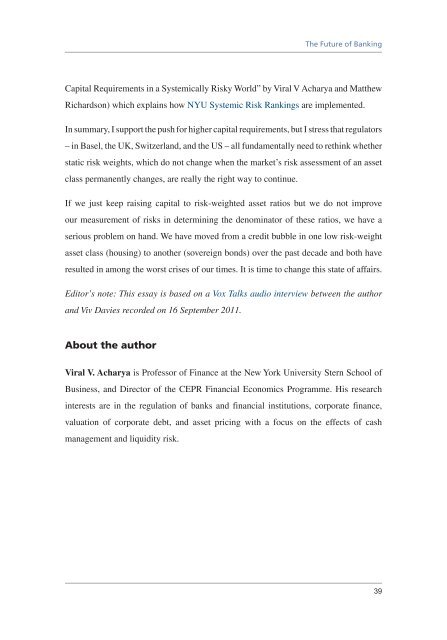You also want an ePaper? Increase the reach of your titles
YUMPU automatically turns print PDFs into web optimized ePapers that Google loves.
The Future of Banking<br />
Capital Requirements in a Systemically Risky World” <strong>by</strong> Viral V Acharya and Matthew<br />
Richardson) which explains how NYU Systemic Risk Rankings are implemented.<br />
In summary, I support the push for higher capital requirements, but I stress that regulators<br />
– in Basel, the UK, Switzerland, and the US – all fundamentally need to rethink whether<br />
static risk weights, which do not change when the market’s risk assessment of an asset<br />
class permanently changes, are really the right way to continue.<br />
If we just keep raising capital to risk-weighted asset ratios but we do not improve<br />
our measurement of risks in determining the denominator of these ratios, we have a<br />
serious problem on hand. We have moved from a credit bubble in one low risk-weight<br />
asset class (housing) to another (sovereign bonds) over the past decade and both have<br />
resulted in among the worst crises of our times. It is time to change this state of affairs.<br />
Editor’s note: This essay is based on a <strong>Vox</strong> Talks audio interview between the author<br />
and Viv Davies recorded on 16 September 2011.<br />
About the author<br />
Viral V. Acharya is Professor of Finance at the New York University Stern School of<br />
Business, and Director of the CEPR Financial Economics Programme. His research<br />
interests are in the regulation of banks and financial institutions, corporate finance,<br />
valuation of corporate debt, and asset pricing with a focus on the effects of cash<br />
management and liquidity risk.<br />
39














